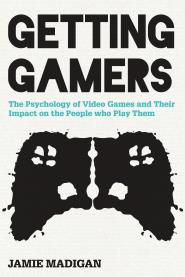
Getting Gamers:
The Psychology of Video Games and Their Impact on the People who Play Them
by Jamie Madigan
GV1469.34.P79 M33 2016
New Arrivals, 2nd floor
Do you like games and gaming? As you play and participate in games, you may want to reflect on the psychology of gaming. The author of Getting Gamers wants to help you understand the ways that game designers, publishers, and marketers use psychological principles to design and sell games. The book covers topics like in-game purchases, violence in games, and the art of fostering competition. As an avid gamer himself, Madigan wants players and consumers of games to understand these principles so that they can derive even more enjoyment out of participating in gaming culture.
Also remember that Andersen Library is celebrating International Games Day this Friday, November 11 starting at 4pm!

We think that this is a better way of “gaming the system,” then usually happens. Psychological games exist, the all-2-human types whitch play out any where there are human psychologies. Such are excellently described by these 3hree skilled (but half-forgotten) authors. First, the great humanistic-psychological book, Games People Play, by Eric Berne, M.D. He recognized stratagems among people such as “If It Weren’t For You,” and “Why Don’t You–Yes But,” and “Let’s You & Him Fight,” and “Ain’t It Awful,” and others. Whether these gritty games can leek and seep into playing the purer game-games noted here, is a subject for Scholarlie Research, which often produces “incorrect answers to non-existent problems.” Then twinstarring here is the great humanistic sociology book, The Presentation of Self in Everyday Life, by Erwin Goffman, Ph.D. He saw human life theatrically, as in “observing the unobserved observer,” and the like. Finely, also note books on Upmanship by Steven (or Stephen) Potter, very British stiffened-upper-lip satire on image-presentation by the quietly-desperate. THESE THREE FINE AUTHORS are INAPPROPRIATELY UNDER-remembered today and are HIGHLY RECOMMENDED and SHOULD BE on the list of every “PERMANENT CLASSIC RECREATIONAL-EDUCATIONAL BROWSING SHELF.” Then it’s back to the non-inhuman(e) games here, for relief.